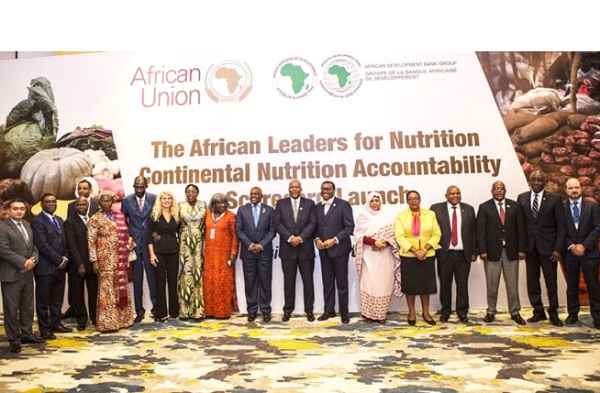Officials at the launch of the scorecardA
A scorecard that provides a snapshot of the status of key nutrition indicators, including internationally agreed nutrition targets, specific interventions, sensitive interventions, policy and legal provisions, nutrition financing, and socio-economic impacts in Africa has been launched.
The launch, jointly done by the African Union Commission (AUC), the African Development Bank Group (AfDB) and global partners, was on the sidelines of the 32nd Ordinary Session of the Assembly of Heads of State and Government of the African Union in Addis Ababa, Ethiopia, a news release said.
President of AfDB, Dr. Akinwumi A. Adesina, said the scorecard presents key findings and recommendations, including calls for governments to increase budgetary allocations for multi-sectoral nutrition plans.
He said while it is obvious that a road and a port can add to improved trade and economic growth, it is often not recognised that stunting shrinks the size of the brain and, therefore, compromises the current and future economic growth of nations.
The scorecard, thus, called for the enhanced empowerment of women and adolescent girls and the provision of nutritional support at the most critical time of a child’s life— during pregnancy and early childhood.
“We must change how we look at the problem of malnutrition. The greatest contributor to economic growth is not physical infrastructure but brainpower, what I refer to as ‘grey’ matter infrastructure. Let us rise and do the right thing for Africa’s children: secure their future with better nutrition. Let us turn the red colours on these scorecards to green. Let us score goals for nutrition in Africa,” Dr. Adesina said.
King Letsie III of the Kingdom of Lesotho and African Union Champion for Nutrition highlighted that the nutrition accountability scorecard offers an opportunity to lay a solid foundation to aid African leaders to act strategically and deliberately in implementing policies and investing in nutrition programmes that tackle malnutrition in respective countries.
Poor nutrition is responsible for stunting children’s growth, harming children’s educational development and future economic prospects, but Africa remains the only continent with high levels of malnutrition and suffers slow progress to reverse the situation in comparison to the rest of the world.
Data from the United Nations indicate that the number of stunted children in Africa increased sharply from 50.6 million in 2000 to 58.7 million in 2017.
By Jamila Akweley Okertchiri

